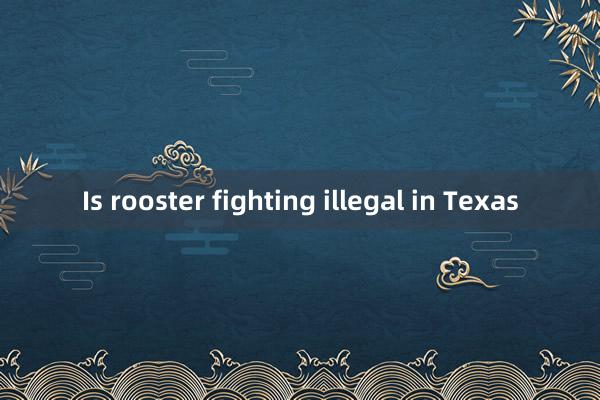Is cockfighting legal in India

Is Cockfighting Legal in India?
Cockfighting, a blood sport where roosters are pitted against each other in violent combat, has a long history in many cultures, including India. It is often tied to traditional celebrations and rural fairs, especially in regions like Andhra Pradesh, Tamil Nadu, and Telangana. However, despite its deep-rooted cultural presence, cockfighting raises significant legal, ethical, and animal welfare concerns. So, is cockfighting legal in India? The answer is both simple and complex.
Legal Status of Cockfighting in India
Under Indian law, cockfighting is illegal. The primary piece of legislation governing animal welfare in India is the Prevention of Cruelty to Animals Act, 1960. According to this law, any practice that inflicts unnecessary pain or suffering on animals is prohibited. Cockfighting, which often results in the severe injury or death of the animals involved, falls under this category.
The Prevention of Cruelty to Animals Act specifically addresses organized fights involving animals, making cockfighting a punishable offense. The penalties for violating this law include both fines and imprisonment. However, enforcement of these laws varies significantly from region to region.
Regional Variations and Loopholes
Despite its illegal status, cockfighting continues to thrive in various parts of India,chich69 especially in rural areas. This is largely due to cultural traditions, go88 tài xỉu local politics, phim rule 34 and a general lack of law enforcement in certain regions. In states like Andhra Pradesh and Telangana, cockfighting is particularly popular during the Sankranti festival, a harvest celebration where many rural communities participate in this blood sport. In such regions, cockfighting events can attract large crowds, significant betting, and political patronage.
While the courts have consistently ruled against cockfighting, regional political leaders often turn a blind eye to these events due to the pressure of local customs and traditions. Some politicians even actively participate in these events, offering sponsorships or attending as honored guests. This makes enforcing the national laws challenging, as local authorities may be reluctant to take action against influential community figures.
Judicial Rulings
The legal framework against cockfighting has been strengthened by several court rulings. In 2018, the Supreme Court of India reaffirmed the illegality of cockfighting, directing states like Andhra Pradesh and Telangana to strictly enforce the Prevention of Cruelty to Animals Act. The court's ruling was a response to public interest litigations filed by animal rights groups, which argued that cockfighting not only violated animal welfare laws but also encouraged illegal gambling.
The judiciary has been clear in its stance, but the reality on the ground is more complex. Despite these rulings, cockfighting continues in many regions, often with little to no intervention from law enforcement agencies.
Cultural and Economic Factors
go88 hitCockfighting is more than just a sport in some parts of India—it is a deeply ingrained cultural tradition. For generations, it has been associated with festivals, community gatherings, and rites of passage. Many supporters argue that cockfighting is part of their heritage and should be preserved as a cultural practice.
In addition to its cultural significance, cockfighting has economic implications. Large sums of money are often wagered on the outcomes of these fights, making it a lucrative activity for some individuals and communities. In rural areas, where economic opportunities may be limited, cockfighting can provide a source of income for breeders, handlers, and bettors.
Animal Welfare Concerns
While cultural and economic factors keep cockfighting alive in India, the animal welfare concerns are undeniable. Roosters used in these fights are often equipped with sharp blades or spikes tied to their legs, causing grievous injuries to both animals during the fight. Many of the birds die from their injuries, while others are left permanently disabled.
Animal rights organizations have long campaigned against cockfighting, arguing that it is inhumane and violates the basic rights of animals to live without suffering. These groups have called for stricter enforcement of existing laws, more severe penalties for violators, and increased public awareness of the cruelty involved in cockfighting.
The Way Forward
The future of cockfighting in India is uncertain. While the legal framework clearly prohibits the practice, enforcement remains weak in many regions due to cultural and political factors. Efforts to curb cockfighting will likely require a combination of stronger law enforcement, public education campaigns, and cultural shifts.
One potential way forward could be through community-led initiatives that offer alternative ways to celebrate traditional festivals without involving animal cruelty. Promoting awareness of the ethical issues surrounding cockfighting and encouraging local leaders to take a stand against it could also help reduce its prevalence.
Conclusion
In conclusion, cockfighting is illegal in India under the Prevention of Cruelty to Animals Act, yet it continues to thrive in many regions due to cultural traditions and lax enforcement. While the judiciary has consistently ruled against it, significant challenges remain in terms of enforcement, particularly in rural areas where the practice is most popular. Addressing the issue of cockfighting in India will require a multifaceted approach that balances legal enforcement with cultural sensitivity and public education.
Jilievo Com Login registrationwww.uailde.com






